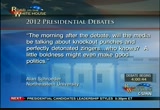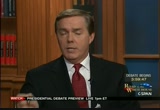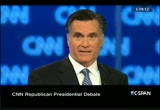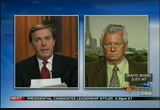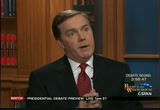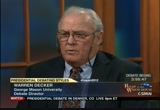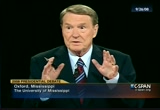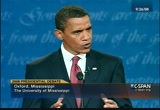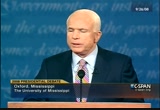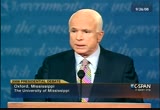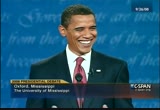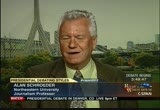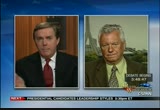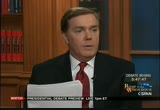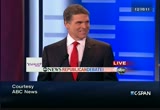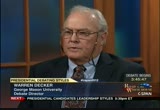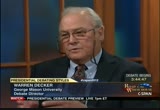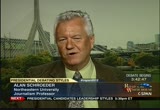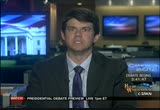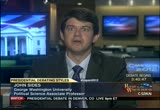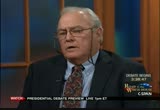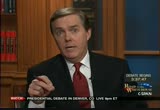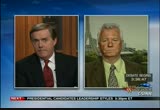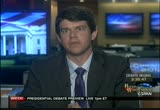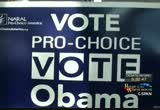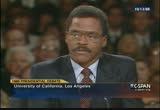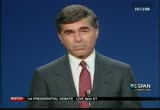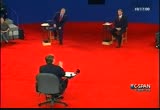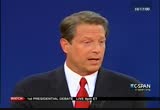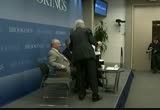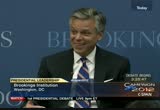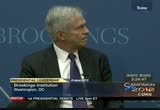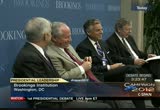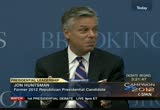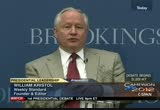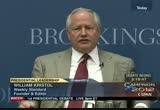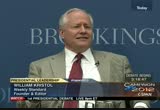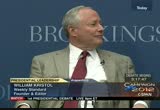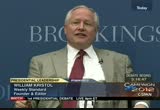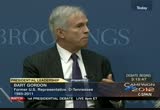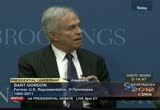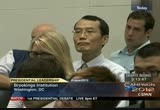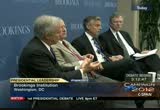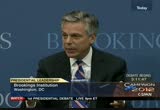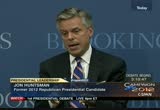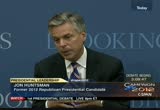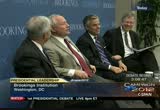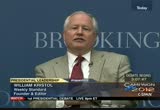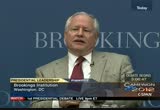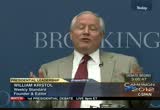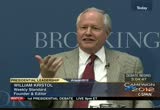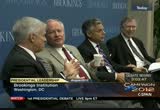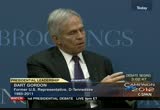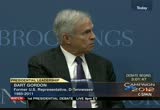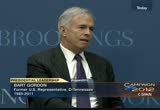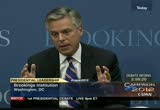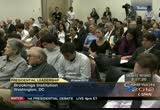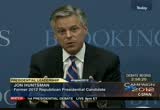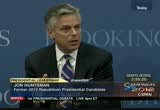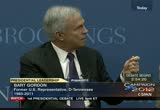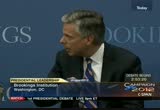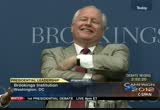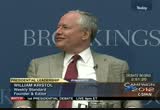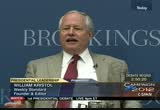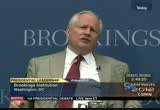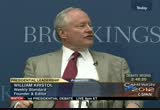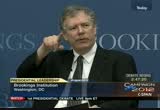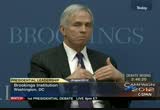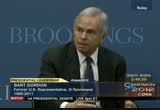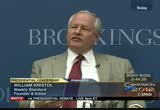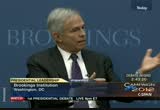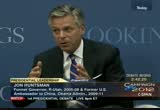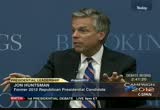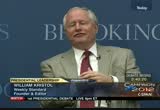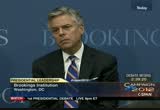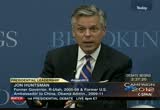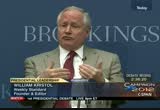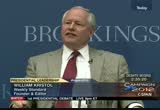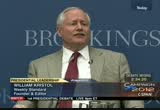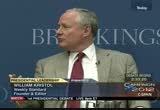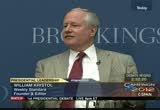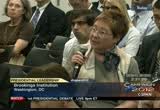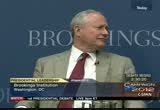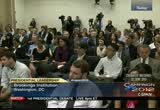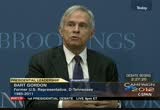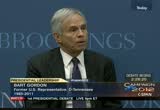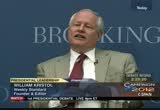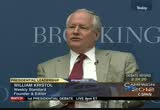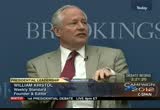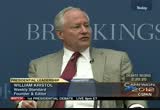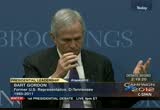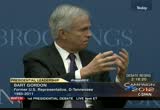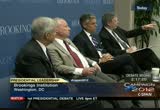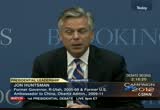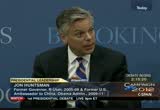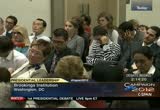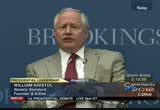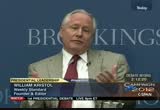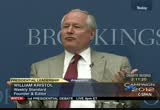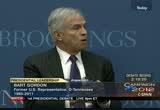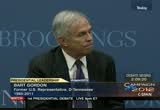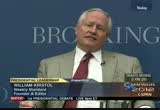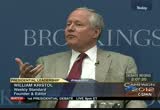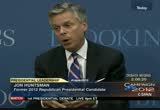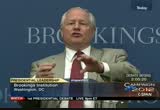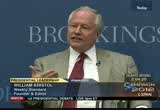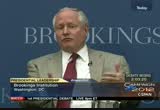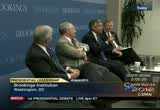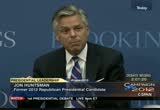tv U.S. House of Representatives CSPAN October 3, 2012 5:00pm-7:00pm EDT
5:00 pm
who knows? a little boldness might make good politics." what do you mean? >> i mean this idea of not approaching this debate as of the largest audiences they will ever face in their entire political careers. it is a shame to not take advantage of that. i understand why they are reluctant to do anything to dramatic or too theatrical. on the other hand, it is a platform that could be taken advantage of if they so choose. i think other debaters like reagan and clinton have understood that better. >> more than 20 primary debates for mitt romney, including this one that aired on cnn.
5:01 pm
the moderator questioning mitt romney on his taxes. >> you mentioned the democratic attacks. i want to ask you to go back in history. back in 1967, your father said a ground breaking standard in american politics. he released his tax return. he released them for not one year, but for 12 years. when he did that, he said, one year to be a fluke. when you release yours, will you follow your father's example? >> may be. [laughter] i do not know. i will take a look. audience: boo! >> i will be happy to release them. i know there are some who are very anxious to see if they cannot make it more difficult for a campaign to be successful. i am not going to apologize for
5:02 pm
being successful. [applause] i am not suggesting these people are doing that. i know the democrats will go after me on that basis. that is why i want to release these things at the same time. my dad, born in mexico, toward, did not get a college degree. i could have stayed in detroit like him and gotten pulled up in the car business. i went up on my own. i did not inheret money. what i have, i earned. [applause] i will be able to talk to president obama in a way no one else can about how the economy works. we are one nation under god. >> that did become a debate moments in this primary season.
5:03 pm
>> right. it is an interesting moment. it is a moment i think may replicate itself in general election debates. i cannot imagine obama will let this question and the tax returns go unremarked. what you see there is a couple of things. romney really pivots. he uses the initial question to swing us over to obama and the democrats and how they are against wealth, supposedly. there is also the reaction from the audience. one of the thing that was striking about this year's round of primary debates was the role of that live audience and how they became the influence and how people are perceiving them. in general election debates, the audiences seem to be much more behave. clearly, the audience played a big part in the whole tone of that clip you showed.
5:04 pm
>> warren decker, these candidates have lines and talking points. how you come across conversationally rather than sound like somebody who is regurgitating the talking points you have been rehearsing? >> that is probably one of the most difficult things you could ever do. i think it is one of those things that you can try to do it and improve your ability to do it by practicing a lot and trying to play on moments that would allow you to convey yourself well. the person that was really good at that was clinton. he was very quick and he sounded like he was talking to the people most of the time rather than trying to give more prepared types of comments. at the same time, he was quick to get his message across.
5:05 pm
i think it is one of those things that is really difficult to do. i think it may well be very difficult for both romney and obama to do that. i am not sure they are quite in the same ballpark as clinton was. i probably would, if i was trying to figure out which one might do that better than the other, i would probably give obama just a little bit of an edge because he comes off as being a little bit softer and a little bit more connected in some ways than romney does. that is a problem with romney. it is probably one of the biggest problems he needs to overcome. >> the moderator posting his 12th presidential debate. in 2008, he was trying to get both senator obama and senator mccain to address each other and answer some of the questions. >> let's go back to my question. how do you stand on the recovery plan? talk to each other about it.
5:06 pm
we have five minutes. we can negotiate a deal right here. do you favor the plan, senator obama? senator mccain, are you in favor of this plan? >> we have not seen the language yet. i think there is constructive work being done out there for the viewers who are watching. i am optimistic. the question i think we need to ask ourselves is how did we get into this situation in the first place? two years ago, i warned that because of the relaxed regulation, we would potentially have a problem in trying to stop the abuses and mortgages that were taking place at the time. last year, i wrote to the secretary of treasury to make sure he understood the magnitude of this problem and to call on him to bring all the stakeholders together to try to deal with it.
5:07 pm
the question i think we have to ask ourselves is yes we have to solve this problem short term. we will have to intervene. there is no doubt about it. but we will also have to look at how is it that we have shredded so many regulations, we did not set up a 21st century regulatory framework to deal with these problems, and that is in part having to do with an economic philosophy that says the regulation is always bad. >> will you vote for the plan? >> i hope so. >> you will vote for the plan? >> sure, but let me point out i also wonder about freddie mac and corporate greed and excess and ceo pay and all of that. a lot of us saw this coming. there is also the issue of responsibility. president eisenhower wrote out letters. one of them congratulated the
5:08 pm
great members of military allies that have conducted and succeeded in the greatest invasion in history still to this day and forever. he wrote out another letter. that was a letter of resignation to the united states army for the failure in normandy. somehow, we have lost that accountability. i have been heavily criticized because i called for the resignation of the chairman of the securities and exchange commission. we have got to start also holding people accountable and we have got to reward people who succeed. somehow, in washington today, and i am afraid on wall street, greed is rewarded, excess is rewarded.
5:09 pm
>> do you have something to say to senator mccain about what he just said? >> i think senator mccain is absolutely right we need more responsibility. we need that not just when there is a crisis. we have had years in which the economic ideology has been what is good for wall street but not what is good for main street. there are folks out there who have been struggling before this crisis took place. that is why it is so important that as we saw this short-term problem, we look at the underlying issues that have led for wages to go down, for a health care system that is broken, energy policies that are not working, because 10 days ago, john said they are sound. >> say to him? [laughter] >> are you afraid i would not hear him? >> i am trying to get you to
5:10 pm
talk to each other. >> unless we are holding ourselves accountable day in and day out, not just where there is a crisis for folks who have power and influence and to hire lobbyists, but for the nurse, the teacher, the police officer who, at the end of each month, they have a financial crisis going on. they will have to take out extra debt to make their mortgage payments. we have not been paying attention to them. >> professor alan schroeder, your take away. >> in 2008, the campaigns negotiated an agreement that allowed them to talk to each other. they did not want to do it. you see jim is trying to pull teeth to get them to talk to each other.
5:11 pm
i do a lot of research on televised campaigns around the world. the candidates spent the entire debate talking to each other in past debates. it is like a tennis or ping-pong game. the moderator's get out of the way and have a very little role. in america, the tradition has been candidates are nervous about confronting each other and being too aggressive or coming off as rude. they really do not like that dialogue. we will see what happens this year. the format for the 2012 debates calls for open-ended periods of discussion. that will force the candidates to engage with each other. >> with more than half of the debate focusing on jobs and economy, both senator obama and senator mccain were in the u.s. senate. they are used to addressing each other from the senate
5:12 pm
chamber. what is different for the debate? >> it is very easy to cross the line of what is acceptable and acceptably aggressive into something that becomes rude. i am thinking back during hillary clinton's campaign. rick walked over to her podium with a pledge he wanted her to sign. it looked really bad. it was a moment of what not to do. it crossed the line. that is what it is. we were talking earlier about how the candidates approach this with a lot of trepidation. they will have to talk to each other. in their way of looking at it, it is one more thing to worry about. >> this is from december of last year. warren decker, we will get your
5:13 pm
reaction to this as mitt romney was asked about a question and then placed this bet. >> i am listening to you, and i am hearing you say the right things, but i read your first book. it said your mandate, in massachusetts, which should be the model for the country, and i know it came out in the reprint of the book. i am just saying, you refer to individual mandates. >> you have race that before. >> it was true then. >> i will tell you what. [laughter] $10,000 bet? >> i am not a betting man. >> i say, in my view, each states should be able to fashion their own program. i go on to talk about the states. i have not said in that book
5:14 pm
anything about our plans being a national model of propose innovation. the right course for america is to let individual states -- this is a remarkable nation. this idea of federalism is so extraordinary. let states have their own solution. >> warren decker, another debate moment from the primary. why did that resonate? >> probably, that, more than anything else probably separated romney from a lot of the country when he was able to extend a wager of $10,000, which was probably much more money than a lot of the voters will amass. i think that was about as close
5:15 pm
to being a gaffe as i would label them. when you make a wager, if the wage or $5, $10, i think it probably would have left a very different impression. when he made that wager at first, and then everything after that, i think, the answer really did not have that much of an impact after that because i think most people were still focused on how can somebody make a $10,000 bet as casually as this person just did? i think that is a disconnected that, at times like that, and including some of the comments
5:16 pm
he has made at fund-raisers and so forth, worked two separate him from the voters. >> alan schroeder, was it the fact that he said $10,000 and not $1 million? >> i agree. it is a weird amount to pull out of thin air. $1 million would have been fine. $10,000. one of the things you need to think about if you are a candidate is the negative perceptions that exists about you. you do not want to say anything that reinforces a negative about you. in this case, he fell into that trap completely. we are still talking about it. >> in 2008, a democratic primary debate that included senator barack obama and hillary clinton. here is the exchange. >> my question to you is what can you say to the voters who see a rise in may and like it but are hesitating on
5:17 pm
electability issue where they seem to like barack obama more? >> well, that hurts my feelings. [laughter] >> i am sorry. >> but i will try to go on. [laughter] he is a very likable. i agree with that. i do not think i am that bad. [laughter] >> alan schroeder, another moment from the 2008 primary debate. >> that is actually obama's worst moment in any debate he has ever had. what is interesting is that it is not just that he is so bad. he does not make eye contact. it is that she is so good. she has a very funny way about her and debts of this great line and has the audience with her. there is another thing that helps her.
5:18 pm
that is the little reaction shot of chelsea clinton in the audience laughing. in general election debates, they are careful to prohibit reaction shots of family members because they do not want that to color the tone of the debate. in 1988, michael dukakis could have had help not looking so cold in his response. >> we have a professor at the george washington university, john sides. when you have those moments that reinforce, either good or for ill, to a candidate, how important or damaging can these be? >> candidate debates in a general election to not move the polls a lot. only in a close race.
5:19 pm
in general, i think these dramatic moments in debates are not necessarily game changes for the average american voter. >> you wrote, usually the candidates fight to a draw. it is hard in that context to have a stunning victory or a terrible defeat. can you elaborate? >> the candidates spend a lot of time trying to lower their expectations about the performance and portray the other person as this great orator. in reality, the candidates spend
5:20 pm
a lot of time prepping for the debates and they are very good at it. they have read a lot of material and memorize a lot of material. in that context, it is hard for a candidate to really make a big enough mistake to actually swing opinion too strongly to his opponent. >> same question to all three german. alan schroeder, i will begin with you. what happens? what do you think the candidates are trying to do and how are they trying to get into debate- mode? >> they will still be doing mock debates. i would be very surprised if any candid has a public event. they will have last minute back and forth to get everybody in the right place. the candidates like to go off and be by themselves in the hour before the debate.
5:21 pm
just to have quiet time to get their heads in the right space for what is bound to be a very excruciating experience. imagine actually having to do that in front of 50 million people. basically, those hours before, they want that time to themselves. there is one other quick thing they do. they do a tech check at the set. they will go up on the set and make sure everything is fine and that they are comfortable with the surroundings. that will happen at about 3:00 in the afternoon. >> how does anyone effectively prepare for a debate? >> well, i think this is probably true of just about any kind of debate. hard work is probably the best thing to do. if you are very carefully prepared, if you spent a lot of time studying the issues and figuring out ways to explain
5:22 pm
those to the public, i think that is a big portion of it. also, all of these practice times they have that allows them to prepare themselves for those kinds of debates. it is not an easy task. i think it will be very interesting to see how this upcoming debate plays out. >> john sides, your thoughts? >> i think the candidates obviously spent a lot of time learning, practicing, rehearsing. the goal of that is not to make a big mistake. it is probably easier to lose a debate than win one. it is a strategy of risk aversion. the debates have not consistently affected the outcome. given the consequences of actually losing an election, it behooves them to do as much preparation as possible, even if the debates themselves are not the game changes. >> what about the level playing field, that you have the president on the same stage with
5:23 pm
the republican nominee in a setting many people think gives the challenger the advantage? >> i think maybe it helps the challenger a little bit to be in that role. at the same time, recumbent presidents typically win elections. they have the experience of doing this before. having a policy for the previous four years, the advantage of a very well-prepared campaign. the practice of doing this, where as the challenger has to put that campaign together on the fly. at the end of the day, each side may have a little advantage that it brings to the table, but probably those advantages cancel them out. that is why the two candidates can fight to a draw most times. >> you write this in your book. what will we be talking about wednesday evening and thursday morning?
5:24 pm
>> i learned a long time ago not to make predictions about debates. these are live television shows. you absolutely cannot predict what will happen. based on the history of these two debaters, neither one of them is really a flame thrower. neither one of them is particularly theatrical. their history would suggest it might be a candidate. but again, you never know. >> in terms of preparing for the debates, the moderator role. what kinds of questions should we be looking for? >> domestic policy, as i understand it. i think it with him doing the work on this, i think the moderator will be extremely well prepared. he usually is. you will find answers or questions that are trying to probe the differences between the two of them and probably very effectively so. >> john sides, final thoughts? >> the voters are more influenced by that than the
5:25 pm
voters themselves. the media will process the debate and build that into the narrative of the campaign. that is the point the people will realize what happened. people cannot realize that gerald ford made a mistake. the news media had been talking about it. any impact the debates may have, i am just interested in the post mortem and the cable news chatter. >> john sides is a professor here in washington d.c. warren decker, debate director in virginia. alan schroeder, the author of "presidential debates." thank you very much for being with us here on c-span.
5:26 pm
5:27 pm
5:28 pm
debate will look like. there are no opening statements. the debate will be divided into six statements -- six segments including the issues of health care, a governing and the economy. the moderator will open the segment with a question, then candidates will each have two minutes to respond. at the end, it romney in the president will have two-minute closing statements. live debate coverage tonight starts at 7:00 eastern with a preview. at the the debate, we will get your reaction with emails and tweets. all of that here at c-span. a quick look at previous presidential debates. george w. bush and al gore in 2000. >> by agreement, between the candidates, the first question goes to the governor.
5:29 pm
you have two minutes to respond. kitty was raped and murdered, would you favor an irrevocable death penalty for the killer? no, i do not. i think you know i have not favored the death penalty my entire life. it is one of the reasons we have the biggest drop in crime in any industrial state of america and the lowest murder rates. we have work to do in this nation. we of work to do to fight a real war, not a phoney war against drugs. that is something i want to leave it. -- to lead. even though the vice president has been at least allegedly in charge of the war. we of work to do to double that
5:30 pm
effort. to fight here and abroad, to work with neighbors in this hemisphere. i want to call a summit just as soon after the 20th of january to fight the war, but we also have to do with drug education prevention here at home. that is one of the things i hope i could lead personally as president of the united states. we have had great success in my own state. we have reached out to people in my family's and been able to help them in the early elementary grades. we can fight this war and win this war. we could do so in a way that marshall's our forces and provide real support for state and local law enforcement officers who have not been getting that kind of support due to the way which will bring down violence in this nation. it will help our youngsters to stay away from drugs. we will stop the avalanche of drugs pouring into the country. we will make it possible for our kids and families to grow up in safe and secure in decent
5:31 pm
neighborhoods. to go before we go on -->> before we go on, do you agree on -- >> absolutely not. it is the bipartisan bill that is now ended in the congress. and insurance companies support the other bill. they like it because it does not accomplish what i think really needs to be accomplished, give the decision back to the doctors and nurses and gives you the ability to go to the nearest emergency room without having to call an hmo before you called 911. it will let you see a specialist if you need to. it has strong bipartisan support. it is being blocked by the by republican -- by the bipartisan leadership in congress. i like to know whether the
5:32 pm
governor will support the bill, which is the main one pending. >> answer that if you like. >> the difference is, i can get it done. i can get something positive done on behalf of the people. that is what the question in the campaign is about. tell me your philosophy and position on issues, but can you get things done? i believe i can. >> what about the grover norquist bill. >> i talked about issues i'd think our report in the patient's bill of rights. if i am the president, we will have an emergency room care. dad orders. direct access to ob/gyn. that is what i have done in texas. that is the kind of leadership
5:33 pm
style i bring to washington. >> you can see those clips from the c-span video library and all of the presidential debates streamed live c-span.org /debates. today we focused on the discussion about presidential leadership styles. jon huntsman used bill clinton's democratic convention speech as an example of what mitt romney should do during the first debate for mitt romney tonight. we will also hear from bill kristol and bart gordon. >> i am darrell west. i would like to welcome you to today's events on campaign of leadership. we are what testing today's events, so we would like to welcome those of you better watching through the internet. we also have c-span with us today. we will be live tweeting the
5:34 pm
event. vileader. during the question and answer time, we will take questions from the live audience, as well as the virtual audience. the question about leadership has been a big part of the 2012 election. this offers wind -- insight into leadership style and approach to management. the question is, how does the presidential campaign shed light on the leadership qualities. what does the campaign experience, as we have seen it so far indicate their approach to management and governance? today we have assembled an outstanding panel of speakers to help analyze the questions. jon huntsman is a past presidential candidate. is a lot of authenticity to discuss the leadership
5:35 pm
questions. -- he has a lot of authenticity to discuss the leadership questions. we are pleased you are here. many of you know that john huntsman was elected governor of utah in 2004 where he compiled a very distinguished record. he oversaw a major improvement in public education. following the service as governor, he was appointed by president obama as ambassador to china in 2009. he left the position to run for president for the forthright discussion of policy challenges. this fall he actually joined the brookings institution as a distinguished fellow. we are pleased to call him our colleague. mark gordon -- gordman is a distinguished fellow at the council of competitiveness.
5:36 pm
he is a former u.s. representative from the state of tennessee. he served in congress for 26 years. from 2007-2010 he served as chairman of the house committee on science and technology. he is working with the brookings institution to improve public sector leadership as part of the new initiative on improving leadership and management. bill kristol is the editor of "the weekly standard" which he founded in 1995. prior to that, he led the publican -- republican feature. he also has served as foreign policy adviser to senator john mccain. all of you see him regularly on fox news sunday and the fox news channel. i met him in 1981 when he was a very young assistant professor at the university of pennsylvania.
5:37 pm
the question that i would like to pose for each of you, and i will start with governor what does this through feel about the leadership styles of mitt romney and president obama? >> probably not much. >> ok, will this panel is over. [laughter] >> you could extrapolate a few things from president obama's first term that may be instructive. he is not the manager. he does out of a history of managing things. you bring in a lot of good, well trained people and give them tasks and try to lead a government. in the case of mitt romney, who has been a governor, a business guy. he has run the olympics. i think his attitude would be efficiency. i will come in and look at running governments, like a
5:38 pm
business, which is not always the right answer because government is not a business. you should always look for efficiencies, but i have not seen a good example yet of a business person that has come into government and made a run like a business. there is a lot of talk about that, but we forget cultures are very different and resumed outcomes are different as well. i think we're missing an opportunity for both candidates to be leading the national discussion on priorities. to begin framing the real priorities for the country, which seems to get lost in the garble for the cavity or the message of the day. it is probably not unusual, because you look at elections in the past, whether it was president obama talking about renegotiating nafta, or bill
5:39 pm
clinton, the butchers of beijing. forging a pretty strong relationship with china. i think you have to discount a lot of the rhetoric and a lot of what you hear about priorities at this point. probably conclude that when they do get an off -- into office that harold macmillan words will probably drive words more than anything else. that is events. if we get back to what you are saying, what will be the management style? what will be the ability based on history to respond to those events as they arise? >> bill, what leadership clues have you picked up? >> we have an incumbent president, so one would argue we know how he will be inclined to president, although some one could argue maybe not. president obama took over in a
5:40 pm
very unusual circumstance. wind at his back, but apparently failed administration and huge financial crisis. rahm emanuel to manage congress. then they end up differing to congress. then president obama had a very different circumstance to face. it may be he wins. hard to know what the congressional split will be, but i assume they will narrow the margin of the house. it might be that actually in terms of president obama, my normal instinct, we know what he will look like in 2014 as president -- 2013 as president. there could be new white house
5:41 pm
officials from chief of staff and security advisers and the like. mitt romney, a little more about? and it would normally be. for mitt romney, he has only been -- he is an experienced man that has a thin resonate for presidential candidates. he is a one-term governor. -- he is an experienced man that has a rather then resume for a presidential candidates. the big achievement was the health-care bill, which seemed like a good idea at the time to him. i do not think it is a very comparable situation. in a funny way, i would say we know less. it is harder to anticipate what the white house administration will look like then it may be
5:42 pm
normally would be the case with bob dole or john mccain or bill clinton, people that have been an office for a long time, either as senator or governorships. one had a sense of the strengths and weaknesses. the other question is the campaign, what have we learned from the campaigns? i will think about that for a minute. that is an interesting question. there is no obvious thing that leaps out. look at the way but romney has run the campaign, therefore he will be this kind of president. t. iran is min it is not the path to really make serious arguments and really educate the public.
5:43 pm
mitt romney has said this himself. it is of anything for a can of it. it is a funny thing for a candidate to say that that is what he thinks of campaigning. you could be a very serious president as george h. w. bush was, but politics is another kind of world. i hired these guys to help me get over the finish line and forget about the seriousness. i do think it is -- it does mean you cannot learn much about how he will govern from the campaign. and president obama's case, he has been in campaign mode now for months. clearly his view is he has to save the country from mitt romney and republicans and will get his 50% by cobbling together various groups. i am not sure anything much he is saying is telling us what he would do in 2013. for a moment that invites, i
5:44 pm
very much agree there is a big debate about the future of the country and fundamental choices on entitlements. we're not getting it. i do not say that necessarily critically. bareboat doing what they feel they have to do. a very small campaign for a big moment. maybe that's a very revealing campaign. >> interesting comments about the 51.1%. we once did a survey and the senator for whom we were serving had a 65% approval rating. i said this is really great. 65 percent. he said i want 90. your thoughts on all, and iran is leadership. -- thoughts on obama and mitt romney's leadership. >> charlie cooke is one of the critical procrastinators around here. the critically said some time
5:45 pm
back that of president obama is reelected it will be despite the economy. if iran is reelected, despite his campaign. i think -- if mitt romney is elected, it will be despite his campaign. i think he grew up in a privileged environment, just like his father wanted to give everything he can. john mccain was someone isolated in his thinking somewhere along the way. also, his parents instilled upon him that because of those privileges, he had a responsibility and that his class had a responsibility to give back and to be a leader later. i think he wants to be president because he wants to make good decisions.
5:46 pm
he wants to reorganize the government so that it is efficient. he can tell you 137 things he wanted to get done. i do not think mitt romney can tell you what he wants to do. he just wants to be a good president. because of that, if he is leavihe is weaving around out there. he was a very progressive governor until he started looking presidentially and then veered over. in the primaries very much over on the right. he did not want 50%. he wanted 51.1%. i am not saying he does not have principles. he does not have a political philosophy. he does that have things he wants to accomplish. because of that, the campaign
5:47 pm
is wondering. he is wondering. i think once you get into office, circumstances to take over. indeed a poker -- a focus for what you want to get done. so far that has been the downfall for mitt romney. potentially that could carry over to the white house. if you look at president obama, and as everyone as said, we have been able to see. he does that have 137 like president clinton but does have those few things that he wants to get done that he is passionate about. and you will see a disciplined and a real focus. you can see that reflected in the campaign. this was carried over as much as could be to the election. a personal discipline, but not
5:48 pm
our real philosophical -- a real philosophical debate. that is how you will see the carry over. >> governor hunt's been, leadership involves not just leading the legislative branch, but leading the congressional brigit. -- governor huntsman. what should we expect with iran in terms of relationship with congress? in obama was a second term, would he do things differently? my sense with president obama is he would learn or be instructed to learn the mistakes of his first term as it relates to dealing with congress. you hear from members of his own party, we want to do the deal, strike out, get things done, but
5:49 pm
we do not have any real engagement on the part of the president. i think if you want to give bold initiatives through, as was the case with health care, you do not hand things over to the legislature and say take it. you frame it. you frame 80% of it and turn it over to the legislature and say get it done. they have to come out ahead in some areas. you have to frame at the outcome 75-80% in order to drive it home. that is the president and executive branch that drives it based on the bully pulpit. i think there will probably be some rethinking about the legislative strategy, if there is a second term. with mitt romney, and i am just guessing, this analytical consulting-like approach to deal making, remember that mitt romney is not a ceo, was not a
5:50 pm
ceo as much as he was a consultant, a culprit -- corporate consultants. he is very well schooled on how deals done.l that philosophy will probably carry over if he becomes president to interaction with the legislature. that will be, what do i need to get done? how to wire frame the negotiation or debate, much like merger and acquisition discussion? you go in behind closed doors and negotiate an out, and move on. my sense is he would keep more of an engaged hands-on negotiator because that would be a natural carry over of what he has done during his professional life. my concern is this, i think we are losing some very valuable time in these weeks to properly framed the two or three things that must get done.
5:51 pm
in my own experience as governor, i have found their wearing down the priorities, you could never get them all done, but frame two or three of things that must be done and articulate a message to get through to the voters and then put pressure on members of congress so that you are partly home by the election. i think that is where these weeks ahead could be critically important to framing and actually having done some of the negotiation before the election, because i believe the honeymoon period, if there isn't is one left in politics, is probably getting shorter and shorter. you have a short amount of time to actually get those one or two things done. they better be articulated and framed in ways they get you at least part way dare fight election day. -- part way there by election
5:52 pm
day. >> probably not going to happen. >> there will not be a serious discussion in the country over the next five weeks. they're both running the kinds of campaigns they have chosen to run. it is not going to change. it is not what i would have recommended to their running. i think he would've been better off running up conferred -- conservatives' agenda campaign. that was very striking that mitt romney announced about the last five weeks. if you elect obama for the next four years, there will be no better than the past four years. i happen to believe that is true, but not very inspiring. it is hard to blame the guy. he wants to get reelected with a
5:53 pm
pretty narrow cast approach to democratic and independent constituencies. i do not think we will get the kind of framing you would like. i am a little less pessimistic. i do think reality matters. and we will hit a cliff and all kinds of ways. the fed cannot keep printing money and expecting the world to take it or buy treasury notes to fund trillion dollar deficits forever. the economy is slow and going into another dip. i actually think the next president will have a moment between november 7, and i do not know, this summer or fall of 2013 to do a lot. i would bet there is a huge legislative agenda in 2013.
5:54 pm
i did not really by the gridlock argument. if obama gets reelected, evil have a mandate basically -- he will have a mandate basically the lesser version of bowel- simpson. if romney wins, he will have a mandate for some version of the right and budget, probably tempered a little bit to get democratic votes. if he becomes president, he what the mandate for something close to that. either way, we will probably get a pretty big deal. i think 2013 becomes a big entitlement reform, tax reform, budget reform moment. there will be an amazing pivot on november 7. suddenly the campaign will be over.
5:55 pm
guess what, we are going to have entitlement reform. all of the things is that about mitt romney will destroy america, suddenly we will do something that will not look that wildly different from the reforms the republicans talk about. mike leavitt is actually working pretty seriously on what they would have to do. the disconnect, i do not know if it is good or bad. probably not good, i did not know how bad it is. the disconnect is something close to an all-time high i would say. have a conversation with stuart stevens and then a conversation with mike leavitt. it is just two different worlds. i honestly believe it would not be that the similar period a very different conversation that the one you would have with jack
5:56 pm
lew it or whoever is thinking through what obama would do in november/december of this year and for six months of next year. i do not think it is impossible. i think maybe it is just the way we will conduct ourselves, which is pick extremely quickly after election day. i do not buy the argument the partisanship is so bad. that will be an unusual situation, what we have not had in a long time. in any case, i think -- it is not going to be a lot of clues about this over the next five weeks, i do not think. >> which is unfortunate. >> congressman gordon. >> the partnership --
5:57 pm
partisanship is very bad and will take leadership to get through that. going back to the ambassador's comments about how their romney would govern. i completely agree with the deal making aspect of working with congress. we saw that as governor of massachusetts he brought democrats into the cabinet. he did a good job there. i think he personality-wise would do well there. i also think he would try to bring the efficiency to the executive bridge and will be a failure at that. bureaucrats feel like they will be longer there than you are. elect officials. they know what they want to do. -- elected officials. by and large, it is hard. he will have more trouble with his own executive branch, i think, than with the legislative
5:58 pm
branch. let me disagree a little bit with president obama on his style. in the second term of president, that is the legacy term. you get focused. he will pick out things he wants to get done, and will be very engaged. i would also disagree somewhat with health care in that i think -- again, he came in with the platform of crisis. everything was falling apart. not even really knowing how bad it was. with health care, that is something he really felt he wanted to do. i was one of the holdouts on the energy and commerce committee. there was being -- there was a lot from at as really quickly. how did it all fit together? i was not ready really to sign up. there was a few of us like that. half a dozen at most. i was at the white house a lot
5:59 pm
in various small groups with the president. he was very engaged, both in the issues and also in the persuasion in trying to bring folks together. i think you will see that with the immigration reform, implementation of the health- care bill in congress and other areas where it will be legacy. you will also see him learn from the mistakes i think of george bush the second in much the similar way and that he wanted to read a book, go to bed. he did not want to fool around with congress. it did not work well very early on. toward the end he got very engaged. it was interesting -- and you may see this with president obama. toward the end president bush really felt somewhat ostracized from his party. he felt there were letting him down in the sense that the right
6:00 pm
wing he could never do enough for them, and he just was really frustrated. for some reason -- i was a blue dog democrats and felt i was being shunned by the liberals, and he just wanted to talk about how do you deal with the other part of the party not liking what you are doing? he is going to reach out to congress and i think he will do a much better job of working with them. >> one of the aspects of the obama administration is how much politics has been driven from the white house. some politicians give lip service but obama seems to have gone pretty for the other way.
6:01 pm
with romney, how do you think he would resonate in terms of the department's between the white house with more >> we have strayed some distance from constitutional government. in a sense, the white house staff has been built up with layers of folks who sort of cushioned the president from the departments and agencies. just being a low-level staffer under reagan, and seen the universe of high-profile cabinet members have interacted, at least from what i could see, more directly with the president, and now we have players that kind of cushion the president. a deputy chief of staff for policy or whatever the case may be. i think we are drifting farther and farther away from that interaction that i think is so important to good government. the president's interacting with
6:02 pm
the cabinet. i don't know that obama is going to change that. that is his operating style. it was similar to that under a bush. i don't think he is going to change that part of it. i don't think it needs to be changed. one of the reasons you cannot get good people to sign up for volunteer or move toward cabinet level positions, once they look into it -- and i have heard this from well-known ceos in the country, when they find out i am one or two steps removed away from the president, being at the commerce department's, thank you, no, i would rather not do that. i think there are two things going on here. one is there is an efficiency issue when you are more removed as a cabinet from the president, and i think you run the risk of not being able to bring your top talent who want
6:03 pm
to interact more at the highest levels of government, given where they might be coming from. with governor romney, given his background and his view toward the efficient organization, he will probably come in, take a look at it, do the metrics, run the numbers, bring in the consultants and tell him what works and what doesn't. >> it better not be the bain people. [laughter] >> he has a huge opportunity, let me just say this, a reform- minded president, as you would hope governor romney would be, if elected, because i am not sure that obama is interested in this, or he would have moved in this direction. so we have a 20th century construct in the 21st century.
6:04 pm
if economics is going to drive our foreign policy, as an example, we have four or five agencies and departments that are part of the international decision making apparatus. we ought to have one. it needs to be streamlined. you have all these groups with a little role in international economic policy making. i am guessing somebody like governor romney would step in and say our foreign policy needs more of a healthy dose of international economic involvement. we have trade, for example, which i think president obama dropped the ball on for most of his four years. we therefore need a structure that allows us to get their. one would hope that, given the smart, analytical folks he might surround himself with who are used to looking at complex corporate organizations, that they would actually make some recommendations that would
6:05 pm
bring our bureaucracy into the 21st century on things as important as international economic decisionmaking, just to name one. there are many others, but that would be my sense of it. >> once again, it would probably waste the first four years. there are a lot of authorizations, when you start changing around the pieces on the table, you have to get congressional approval. for example, right now, noaa. fish or raccoons, however you might want to look at it. it makes no sense. they are trying to make some changes there. it is not as much an executive
6:06 pm
fiat, as much as needs to be done, it would be difficult to do it that way. you almost have to take the structure that you have, and again, you will have to be one minded on two or three different issues. much of trade is not just one area. there is more than one in bureau or agency there. you really have to have the cabinet working as a team on two or three issues and driving it down, all in sync. you can only do that on just a few issues. >> on a much smaller level, when people say it cannot be done -- win was the last time we had a president actually stand up and say that the part of government
6:07 pm
-- of government, i am going to reorganize the the following way, for the following reasons. and can remember anyone standing up with clarity at the beginning of an administration and saying is going to look all little different, and here is what we are going to do for the following reasons. and then driving the narrative from there. there is that difficulty mechanically with congress, there is no doubt about that, but let's at least our conversation. >> you are taking care of taxes and budgets and entitlements and all that. if it was a clear, pretty day, that would be a good task and something that would serve a great purpose. but you will have to have all hands on deck over this next year dealing with the budget. it is going to be hard to do that and also drive the other.
6:08 pm
>> the authorizing committees in congress or a huge problem, of course. i would say if congress legislates loss that's -- what authorizing committees now do is attached little part of the pervez that they controlled or departments that were authorized 20 years ago. when i came to washington, it was considered a a little questionable for members of congress to get too much into the administrative side of the department's activities. there were a lot of competitive grant programs, etc.
6:09 pm
now they just feel they have the right to tell the agencies what to do on programs that the have supervision over. it is not friendly to efficient and sensible administrations. but that is a big deal. i would say on the wrong side, i think what they are thinking is, we have a huge agenda in 2013. we probably only have six-nine months to do it. you have to pass under huge budget reconciliation bill that includes entitlement reform. and replacing large chunks of obamacare and paying for it. they cannot do that -- they will
6:10 pm
have an extremely strong white house and omb and treasury. there would almost be two romney administration's. they have to deal with the immediate issues. whoever is budget director, paul ryan as vice president, and whoever is the treasury secretary, i would guess twice a day at the white house meeting with senior white house staff. then there would be the rest of the obama administration were i would hope that would be -- a whole bunch of other things could be done in departments
6:11 pm
that need to be improved from a policy point of view. my sense is that the romney people are very focused on that first six-nine months. if i were advising romney, i would say put them all at the white house, omb, and treasury at the beginning. they need the best, most experienced people to really make those decisions early and to work with congress. i would get a couple people who have served our are very familiar with congress. obviously cannot just dictate to congress. they will need to make that step happen very fast. a very strong white house chief of staff and budget director.
6:12 pm
it was impressive what they did. being able to get that stuff through, we look at history in retrospect, the fact that reagan did it was pretty startling. >> governor romney is also going to have the difficulty of just a changed administration. the confirmation process now, you probably will have to have whatever the new term for czars are in the administration trying to cobble together the jurisdiction of various agencies to push whatever needs to be done. >> i would like to involve our audience. if you have a question, raise
6:13 pm
your hand. we have a question over here. if you can give us your name and your organization and we would ask you to keep your questions brief so we can get to as many people as possible. >> there was al gore's reinventing government, but what it comes down to is, no matter who is elected, the president at that time should come up and say look, we cannot do it with democrats or republicans. we have to get a bipartisan solution to this. it would not be bad to have governors come in and say look, we are in a crisis here. we need to get something done. let's get it done caller:. but that is what all of america would like to see. the model for congress in the house or the senate, if you want
6:14 pm
to go from minority to majority, the model has been well established. if you are in the minority, you try to stop the majority from getting anything done. as chairman of the science and technology committee, we passed 151 bills and resolutions in those four years, and all were bipartisan. i found that is the responsibility of the majority, whether in the house or the senate or wherever you are, it is the responsibility to reach out to the minority. when mitch mcconnell says his job is to cbp, it is a little tough. you may have to go down to something else. the majority has to really reach out, and then maybe you can get
6:15 pm
cooperation. >> there are two models on how to do this, and i don't really have a view about which would be better in 2013. deal.s the leadership bil you had gingrich and clinton in 1997. the other model would be great in 1981, bush 2001, which is to go kick off 10 democratic senators are vice versa i think it would be an interesting question for mitt romney. does he think he has to sit down with harry reid? i think the same for president obama. i think republicans are
6:16 pm
underestimating how strong obama will be if he is reelected. hold allhink he could the republicans against an obama version of a budget deal. i think that have more leverage over members are around campaign finance issues and other things. i think obama -- even if the democrats don't control all of congress, he would have some leverage to go around leadership. people say bipartisanship, but there are two forms of bipartisanship. one is the leadership negotiant and the other is -- the premise of both of those is, there has to be personal relationships to
6:17 pm
develop before that can occur. the ambassador pointed out that governor romney will have those talents. i think president obama knows he has them, he will just have to now demonstrate the more. >> so the reality is this, we are a few short weeks away from the real work starting. be a moment ofl real clarity after the election. we will all wake up the next morning and some will be happy and some will be sad. then the expectations will be there. we've got to move. people will start thinking little differently about what needs to get done. the fiscal cliff and the reality of a downgrade from s&p and the impact that would have on the market, that is very real. that will focus the attention of a lot of people, which is a good thing. i do believe that will be a
6:18 pm
productive period, maybe more so than people might imagine today. you raise another good point about governors, and having been one, here is what the next president has an opportunity to do. having been chair of the western governors association, just a highlight this point, i don't remember a time in recent history where a president has actually used the governor's effectively to drive policy. if ever there was a truly bipartisan group, people having to go back and report to their constituents or you do not get reelected, it is a can-do position for the most part. we have a time during this important 10-month stretch ahead. here is what i will be focused on. some of you might disagree, but hang with me. as for you, i need some help on
6:19 pm
things like energy policy, because that is going to be hugely important. i want you to drive it, because so much that has to do with our public lands and the attitudes locally that will help me help you in making this a reality. i think engaging, harnessing, and even asking for the help of the nation's governors. typically they meet with the president once or twice a year and get briefings. i need some help on energy policy. let's help fill in some of the gaps and make it a national effort, if you will. i think there is huge, untapped potential in that area that could speak to bipartisanship. >> the biggest policy achievement of the last 20 years might have been welfare reform.
6:20 pm
that was dumb by clinton -- that was done by clinton. i think you could imagine -- you can do serious health care reform. even obamacare will depend on the states doing some things. governors understand those issues. >> i think governor romney would be in a position to instinctively understand the culture of governors, how to harness them. >> other questions? >> you stated that the president has an opportunity to set a framework.
6:21 pm
congress has been addressed a lot, and things like filibuster reform or the inability for congress to push major reforms or bills. will romney be more successful in that, or is a new congress, do they have an opportunity -- does it happen internally? >> i think this is where the executive branch has enormous power to set the agenda and to frame the issues. my only come in here would be simplify, simplify, simplify. when you are an executive position like governor, which i assume is much like the presidency, you have to simplify your list of things you are taking before the american people. your ability to get things done is pretty limited, and you have
6:22 pm
to be realistic about that, which is achievable. for the next president, i think framing the to our street must have items -- framing the two or three must-have item. i do believe that the next 10 months will require a very precise delineation of the two or three things that are the moust-haves. will probably be around tax reform and spending. if we can get through the next year, something along the lines of the simpson-bowles deal, lowering the rate and broadening the base, the target on spending of the next in years, something between the rhineland and simpson-bowles, and then have energy policy. i think natural gas will be the
6:23 pm
most powerful boon to our nation's bottom line than we have seen in probably two decades and could very well established a review of our manufacturing muscle in this country and what our expectations ought to be going forward. i think it will be hugely consequential, economically. that is just an example of maybe three things that could be allies, without wandering off into all the reform areas. probably not realistic, given the reality of the political constraints over the next many months. >> we all tend to project the recent past into the future. there has been a lot of legislation passed in the last 20 years. there is right in 1981,
6:24 pm
obviously, with his initial budget. reagan 1986, tax reform, generally bipartisan. there is bush in 1990, the budget deal. his whole party rebelled against it, but nonetheless, it passed with bipartisan support. the americans with disabilities act and other environmental legislation as well. then we get under clinton, we get welfare reform in 1996 and bush does both the tax bill and no child left it behind with genuine bipartisan support. there is the usual partisan fighting, but then every years there is a pretty big legislative achievement. the tax i became extremely
6:25 pm
partisan after 2003, and bush tried to be fair. it fell apart partly because of the revolt within his party. the democrats were not willing to give the republicans a victory. obama comes then, i don't the was inevitable. there were so demoralized and 2009. maybe you can explain this, but they went with a partisan stimulus bill. the idea that you could not have gotten a ton of republican votes, it would have been ludicrous.
6:26 pm
i would have supported some version of that in early 2009. i would make you guys vote in the house on cap and trade. i do support a version of dodd- frank. i would be for breaking up the big banks instead of dodd-frank. republicans have a problem in not explain what they would do on that. whoever is to blame, the obama administration became very partisan. in 2011 we had another chance with bowles-simpson.
6:27 pm
there was a moment where it looks like something could happen. what would have been mistaken 2002, i think this system is not so broken or so partisan that we cannot have more like what we had in the 1980's and 1990's on hold budget issue. practical leadership as well as rhetorical will be very, very important. i don't think there is a huge disagreement about it. is anyone going to step up and do that? you could imagine that 2013
6:28 pm
would result lot of these issues that seem intractable. that requires skillful presidential leadership. >> good morning. i am a retired foreign service officer. the subject today is what presidential campaigns reveal about leadership. in the past several months, governor romney has advocated repealing the affordable care act and keeping parts of it. repealing or revoking the dream act and keeping parts of it. i question is, you have suggested that either way deals will have to be struck on november 7. as the governor romney, hasn't his leadership skill then
6:29 pm
primarily one of lack of transparency? >> i think his issues are perfectly reasonable. i am not against having bands on pre-existing conditions. on the remax, i am in favor of -- on the dream act i am in favor of his position. i don't think it is an intellectually ridiculous position that romney is taking. i think romney has a real chance to govern with the right agenda.
6:30 pm
>> back in the corner there is a question. >> the last couple of weeks in particular have been very difficult for governor romney and his campaign. they have done a couple of three boots, as they call them. where do you think his campaign has been missing the mark and what does he come up to do in the first presidential debate and in the remaining five weeks? >> i ran for president and failed miserably, so i am in no position to opine on this one. i am not much of a political analyst, anyway, but let me just draw from a little bit of experience and say that's it
6:31 pm
helps when you look into the camera and speak from the heart in ways that allow the voters to feel the sincerity and the commitment, to the issues around jobs and economic growth, which i think i happen before anything else. is there opportunity tonight to do that very thing? the listeners in the audience may hear the words and make process the data. we all do that. but we also feel something when our candidates speak to us. do you know what i mean? it's all part of the process of winning votes. you have to speak the words that make sense from a policy standpoint, and you have to move people with emotion. as bill clinton did when he spoke at the democratic convention, and my thought after that was, where is our bill clinton in the republican party? i thought marco rubio did a
6:32 pm
pretty good job. but bill clinton just aggregated some complicated issues, simplify them, and delivered them into the living room of every voter. that is what people want. they just want a sincere conversation. just give me the scoop and tell me where you think you can take us. that is where i think there is an opportunity in the weeks remaining. i believe that governor romney has that capacity to deliver that level of sincerity and direction. but let me quickly addressed that. the republicans had a candidate doing that in the primary. that is different. if you look at governor romney's problems, think it goes
6:33 pm
back to two numbers. he is just trying to do what is necessary for him to be elected. there is some of that lack of sincerity. the other number is the 47% that we have heard so much about. i think he went into this with a tin ear because he was not around regular people that much. the campaign has hopefully allow him to better tune and to that. he does has to look presidential and able, and that get him started. then he is going to have to reach into himself and think about the people he has met on the campaign over the last few months and really talk about what he feels about them. then you have to make some structural changes.
6:34 pm
they are going to have to get into the battleground states and get their field offices. >> having beaten up the romney campaign for the last few weeks, i will forego beating them up again. i have been critical of them and remain critical, but i will say this. looking at the numbers today, where are the actual poll numbers? they are not much worse than that were two weeks ago. if i were axelrod or david plouffe, i would be a little worried, actually. i wonder whether the obama
6:35 pm
campaign will look back at this last few weeks as an opportunity to pull ahead. now we go into the debate with a three-point race. it is like structurally, it remains a weak incumbent running for reelection. he is somewhat vulnerable. i wonder if they could have done more. everyone keeps saying romney should make a major speech or this or that. if i were a democrat, i might have taught --, have thought he should be doing a little more to lay out a bipartisan agenda.
6:36 pm
one of them has got to be able to discredit the other. i think he has left mitt romney more running room that i would have expected. a few weeks ago i would have thought the numbers would be worse for romney. >> there is a microphone coming over to you. >> i am just curious about what you think the dynamic would be if governor romney is elected between him and paul ryan as the vice president, and then dealing with the house. and not having the filibuster proof the senate. what does that look like?
6:37 pm
it does not seem like there that many predictions that things are really going to change. i have been speaking to a t. party activists who says -- dimon >> if romney went, i would assume republicans hold the house and do not lose in the house seats. yes, there will be complaining for this or that by some people, but i think he has the ability to pass those issues through the house at the end of the day. i think he is in reasonably good
6:38 pm
shape in the senate, at least for the state reconciliation bill. republicans think john boehner is going to hold republicans against that in the fall i do not buy. i don't think harry reid can hold the democrats. that will be a fantastic question for romney and right as to how much they are willing to compromise. there are some practical questions there, obviously. these things are hard to predict. i tend to be of the view that
6:39 pm
either one it wins will have a strong hand. the crisis will make them stronger. the fact that he has to move on the debt limits, the fact that the whole business community will be saying the corporate tax rate is crazy, no matter what your ideological view. it is crazy to hurt american business when they are competing with businesses abroad. i think the president will be in a strong position to shape the agenda. whichever man as president, i think we are overdoing how much mitch mcconnell or harry reid is going to stop a newly elected president are newly reelected
6:40 pm
president on the core parts of his agenda in 2013. >> i predict that in all likelihood, president obama will be reelected. there is a good likelihood that the senate will very narrowly stay democratic. it is almost certain that the house will stay with the republican majority. you it used to be that we knew at the end of the day, at the last hour, everybody would give some and we worked it out. these are very big stakes. after the election you will see the business community, and hard saying we have got to step up. republicans have got to make compromises. democrats, if you want jobs, i am going to go away if you don't
6:41 pm
do this. i think you are going to see john boehner -- he knows what needs to be done. if necessary, he will sacrifice being reelected speaker the next time around to do the right thing. i think he and the president can get together and the president's will give on entitlements. john boehner will give on taxes, in the sense that rates will come down but there will be enough left over from doing away with loopholes that you have six months. the senate is where it is all going to start. you'll see the top leadership come together with the framework. the candid the framework together. that has to be initiated in the
6:42 pm
house. i think that will be the framework. that can be where folks can rally around. you are going to have to set a framework within the lame duck session. you cannot go to the end of the year because it will start to smell. it takes some time to be able to get it right. you have to do corporate and personal factors together. it will just take a while to go through it. whether the fourth of july or the august recess, there have to be deadlines like that. i am an optimist, and i think all that will come about, but it is fragile. it is going to have to be about the partisan situation. i think the adults will step forward.
6:43 pm
even at the risk of alienating some of their own party. >> dad, what will not need to happen to the gop if romney loses? >> what needs to happen? >> i am so glad my daughter through me a softball question. there will be all the predictable finger-pointing and the blame game, as is the case at the end of any losing campaign. in the party will wander for a
6:44 pm
while, maybe like yugoslavia at the end of communism, were you have several entities that kind of fall out of line, and have no real direction, governments, or leadership. takes a while to sort that out. i don't know what that means, longer term, when you look at the viability of the party. we are going to have to come around and recognized that we have to stay relevant. we have to stay consistent with demographic changes if you are going to be a bible party. you have to be consistent with your family principles. leadership,ncoln's teddy roosevelt and eisenhower and reagan's leadership. all republicans.
6:45 pm
our first president was a republican. we have everything from the importance of individual dignity and our political discourse to articulation of the humanity we are passing down to the next generation, as stated by the roosevelt the importance of our infrastructure system was discussed by eisenhower. reagan was able to sit down with the evil empire to engage in direct negotiations. we are drawing from a long history of important achievement for this country. at some point, as republicans, we are going to have to have a discussion about what republicanism is today in the 21st century, while drawing from our roots and while recognizing
6:46 pm
that we have to keep pace with changing demographics. that is just the reality. companies go broke if they lose their customer base. we also have to have a heart and soul. it cannot just be a holding company for fund-raisers and a convention every four years. you have to project the vision. we are not there yet. >> i like that headline coming out, the gop is like yugoslavia at the end of communism. [laughter] >> people are already working on those articles. one thing i would add, there is a real existing republican party
6:47 pm
in the country and more importantly, there are real existing republican governors. it is not as if they go away. bob mcdonnell is exactly government virginia and bobby jindal is governing louisiana. scott walker is governing wisconsin. i think they have the ball. from my point of view, that is good. that are the kind of conservatives that i like. that have become extremely important. maybe they do a little bit of blocking in holding and negotiating with president obama if he wins. i think the governors become central to the future of the party in terms of the actual policies versus politics.
6:48 pm
they will be governing in many states where romney will have lost. i think they become really central and will be hard for us in washington to remind ourselves that they are more important than what happens in the leadership and the house and senate. everyone assumes the republicans will hold the house, even if romney loses. i am not so certain about that. this is just an analytical guess. i think people are underestimating the variance of outcomes that could happen. i think he could be a six or seven. victory for obama.
6:49 pm
i am not so sure republicans will hold the house. if you do the math, you do lose the house. you could have more turmoil, and that would be big. if republicans lose, of course, you cannot lose the house. for that to happen would be a huge shock. >> as an outsider, that we quickly agreed to disagree. of course there will be finger- pointing. you have to go through all that. at the end of the day, the house is going to stay in republican hands. whether the republicans have a majority or not in the senate,
6:50 pm
they still have the filibuster. it is not going to be an even if any moment. -- it is not going to be an epiphany moment. there will be some that will have the courage to say we lost because we did not go to the middle. that will go on and on and on. i think the two-party effect will linger a little bit longer, but the two-party is not the individual members, it is the fear that the tea party will instruct modern republicans about the primaries, that will stop them from having that really good conversation. that did not get wiped out, that have to let this tea party thing get a little further out before
6:51 pm
we can have a really good conversation. hispanics, asians, -- the good news for the republican is, we are going to be doing it the same thing. if we had been more liberal or whatever. the democrats will have some of this same sort of thing. unfortunately, i think he works going to see things pushed along the same for a while and then there will have to be some real thinking in both parties. >> honestly, i think you underestimate how much republicans do. losing two presidential races in a row is a blow in one way.
6:52 pm
i think there will be x combination -- i think there we accommodation of ways of thinking. maybe it could get close to losing the house, i think it will be a shot to the system. the conversation will be, should we be more moderate or conservative? but the tea party does not intimidate members as much as you say. >> how many members completely changed the way they would vote because they did not want the party opponents in the primaries? >> after this year it will be much harder to tell republican
6:53 pm
voters to it is in the primaries. >> they said climate change is not real, whether they believe it or not. >> this is yesterday's discussion right here. let's talk about the reality going forward. what bill mentioned about the catastrophe that would be republican loss in the implications of that to the party. driving this whole conversation in the years ahead will be two things. one, the reality that the fastest-growing party in america is the unaffiliated party. the implications are enormous. couple that with technology
6:54 pm
trends. i would argue that no party has harnessed effectively the internet. that will provide a platform for delivering messages, organizing, fund raising, etc. adequatelynk we can predict where this thing is going over the next years, but i think we are in for some unexpected surprises. i don't think we can even predict what it is like. we will be looking at a horizon that looks so different from today, i don't think we could even forecast what that might be.
6:55 pm
>> i would save your a historian and you looked at 2012, you would have expected a third- party candidate. historically, if you have a bad recession and an apparently failed presidency who promises hopes and change, it was a classic scenario where you should have had a 1992-like program. i have wondered if there is something of structural, or is it just an accident of history? obama has us in these peculiar positions.
6:56 pm
he was the first african- american president so look left could not really challenge him. >> bloomberg would run in the minutes if -- getting on the ballot was done. americans wanted upscale, socially liberal, bloomberg type candidate. the mood out there was for a perot type of candidate. analytically, there is obviously the sentiment. unch is that john is right. it is none is that the democrats are entirely comfortable with
6:57 pm
where obama has taken them. i agree with the republicans, there are very different strains of the republican party. is mike huckabee more to the center or to the right? he's very conservative, but he was also a critic of wall street. he said i think the house in bubble is not sustainable. i think there is a lot of crosscutting within both parties. there could be some really big changes in the next four or five years.
6:58 pm
>> where is ross perot when we need him? >> good question, he got 90 million votes in 1992 and was ahead for part of the summer. >> what happened between 1990 and 1996? nobody wants to stare down yet another perot challenge. i think he only got on a handful of state ballots. can you imagine what theater roosevelt would have done in 1912 when he left the convention in chicago that summer. if he had been on the ballot of every state, or had the internet at his disposal. the big change in the last election cycle, there were able
6:59 pm
to crack the code and getting on state ballots. that has never been done before. that has been the herbal up to this point. no one has been able to get the balance because the bearer's -- the barriers to entry have been so strong. they cracked the code on getting on the state ballots which will be here for personnel going forward. i think that brings a whole new dynamic in terms of how this plays out. craigslist i want to thank john bill, and bart for a very interesting discussion. thank you very much. [applause] [captioning performed by national captioning institute] [captions copyright national cable satellite corp. 2012] >> of next, a
107 Views
IN COLLECTIONS
CSPAN Television Archive
Television Archive  Television Archive News Search Service
Television Archive News Search Service 
Uploaded by TV Archive on

 Live Music Archive
Live Music Archive Librivox Free Audio
Librivox Free Audio Metropolitan Museum
Metropolitan Museum Cleveland Museum of Art
Cleveland Museum of Art Internet Arcade
Internet Arcade Console Living Room
Console Living Room Books to Borrow
Books to Borrow Open Library
Open Library TV News
TV News Understanding 9/11
Understanding 9/11